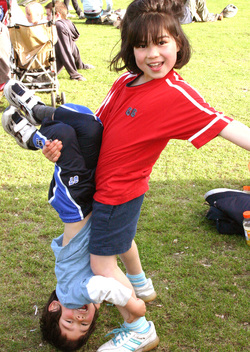About Children and Divorce . . .

All parents want their children to grow up into happy, fulfilled adults. Most parents worry at some point that a current challenge of life puts this goal at risk. Many parents anticipating a separation or divorce feel this concern in a keenly personal way: they worry about the impact of this change on their children.
What does research tell us about how separation or divorce impacts children? This is what we know: the single greatest determinant of the impact of separation or divorce upon children is how parents manage their own conflict.
If you and your partner have shielded your children from your conflict, you may find that your children need special support at this time. Your children may not have received the clues that might help them to prepare for your separation.
On the other hand, if your home has been filled with conflict, you may find that your children receive news of your separation with relief. One research team, Paul Amato and Paul Booth, have found that ending a relationship in which there is high conflict between the parents appears to have beneficial effects on their children.
These findings are hardly surprising. Children love both of their parents—and they need them both. Those children who best weather separation or divorce are those whose parents allow them to have relationships with each of their parents, who support each child in forming an independent relation with the other parent.
When to look for help: All children display behavior during their development journey that worry us as parents—that is normal. Add in the extra challenge of adjusting to separation or divorce, and you may find your child displaying marked or intensely emotional or physical reactions. Reactions are normal—it takes children time to adjust.
Still, it hurts to see your child in pain. Trust your instincts. If, after a month or so, it seems that your child is having a particularly difficult time, most experts say it is time to seek professional advice. There is no better way to reassure your child that you mean it when you say that you want to help in every way that you can.
With this in mind, I recommend two books that some parents have found helpful:
Helping Your Kids Cope with Divorce the Sandcastles Way by Gary Neuman with Patricia Romanowski;
AND,
Good Parenting through Your Divorce by Mary Ellen Hannibal.
Finally, if you have further questions, please don’t hesitate to call. I look forward to answering your questions.
What does research tell us about how separation or divorce impacts children? This is what we know: the single greatest determinant of the impact of separation or divorce upon children is how parents manage their own conflict.
If you and your partner have shielded your children from your conflict, you may find that your children need special support at this time. Your children may not have received the clues that might help them to prepare for your separation.
On the other hand, if your home has been filled with conflict, you may find that your children receive news of your separation with relief. One research team, Paul Amato and Paul Booth, have found that ending a relationship in which there is high conflict between the parents appears to have beneficial effects on their children.
These findings are hardly surprising. Children love both of their parents—and they need them both. Those children who best weather separation or divorce are those whose parents allow them to have relationships with each of their parents, who support each child in forming an independent relation with the other parent.
When to look for help: All children display behavior during their development journey that worry us as parents—that is normal. Add in the extra challenge of adjusting to separation or divorce, and you may find your child displaying marked or intensely emotional or physical reactions. Reactions are normal—it takes children time to adjust.
Still, it hurts to see your child in pain. Trust your instincts. If, after a month or so, it seems that your child is having a particularly difficult time, most experts say it is time to seek professional advice. There is no better way to reassure your child that you mean it when you say that you want to help in every way that you can.
With this in mind, I recommend two books that some parents have found helpful:
Helping Your Kids Cope with Divorce the Sandcastles Way by Gary Neuman with Patricia Romanowski;
AND,
Good Parenting through Your Divorce by Mary Ellen Hannibal.
Finally, if you have further questions, please don’t hesitate to call. I look forward to answering your questions.
